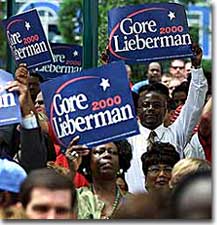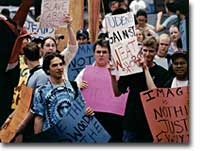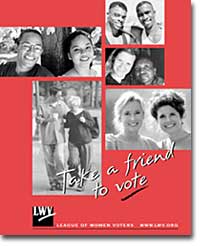4d. Participating in Government

Citizens gather in massive groups as a way to show that they support a particular idea or agenda, in hopes that they will influence the political process. Marches, letter-writing campaigns, and political rallies (like this one for Al Gore) are all methods of participating in government.
People may participate in politics in many ways. They can write their Representative or Senator, or work in for a candidate or political party. They can make presentations to their local school board or city council, or call the police to complain about the neighbor's dog. Partly because of our federalist system, people have many opportunities to participate in our democracy on federal, state, and local levels. Some forms of participation are more common than others and some citizens participate more than others, but almost everyone has a voice in government.
Who Participates and Why?
Experts have found several social and economic characteristics to be strongly associated with high levels of political participation:
- Education.
The single most important characteristic of a politically active citizen is a high level of education. Generally, the more education an individual has, the more likely he or she is to vote. Why? Perhaps because the well educated understand complex issues better, or maybe they have learned the importance of civic responsibility. Or it could just be that their occupations are more flexible in allowing them to take time to go to the polls. Others argue that since educated people tend to be wealthier, they have more at stake in the political process.
One way citizens can participate in government is by protesting ideas, policies, or agencies. Here, some high school students protest inhumane labor practices around the world by taking off their shirts to reveal slogans, rather than wearing clothes made by sweatshop labor. - Age.
Despite the big push in the early 1970s to allow 18 year olds to vote, 18-24 year olds have consistently held the lowest rate of voting. In fact, in recent years their older siblings (age 25-34 don't do a whole lot better. The highest percentages of eligible voters who actually vote are in those groups 45 and above. - Racial and Ethnic Groups.
If only race and ethnicity are considered, whites have higher voting rates than do blacks and Latinos. However, that tendency is somewhat deceptive. Some studies that control for income and education levels have found that the voting rates are about the same for whites, blacks, and Latinos. - Gender.
For many years women were underrepresented at the voting booths, but in recent elections, they have turned out in at least equal numbers to men. In fact, in 1992 and 1996, turnout among women actually exceeded that of men.
Declining Voter Turnout
Since the beginning of the 20th century, American voter turnout has been on the decline. Fewer than 50% of eligible voters went to the polls during the 1996 presidential election. Smaller percentages are routinely reported for congressional elections, and even fewer Americans bother to vote for their local representatives. The United States ranks near the bottom of modern democratic nations who measure voter turnout.
There are many factors that could contribute to low voter turnout. Many analysts cite growing alienation among voters. The scandals of the past several decades have engendered a cynicism that has led to a decrease in political interest, particularly among the nation's young voting population. There tends to be a correlation between self-efficacy — or the belief that an individual can actually make a difference — and voting. Some observers believe that the decline in voter turnout indicates that Americans feel less certain that they can have an impact than Americans of the 19th century.

The League of Women Voters encourages people to "take a friend to vote" when they go to the polls as a way of increasing voter turnout and participation in government.







